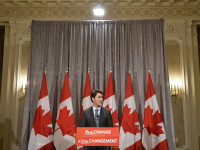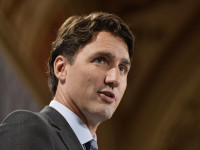Digital policies may not have played a significant role in the just-concluded national election, but the arrival of a majority Liberal government will leave many expecting “real change” on the digital front in the years ahead. My weekly technology law column (Toronto Star version, homepage version) notes that Prime Minister-designate Justin Trudeau is likely to focus on key economic promises from his platform once Parliament resumes. However, there will be several digital issues that should command attention during his first 12 months in office.
Archive for October, 2015
Privacy, Telecom Competition Among Trudeau’s Tech Policy Priorities
Appeared in the Toronto Star on October 26, 2015 as Privacy, Telecom Competition Among Trudeau’s Tech Policy Priorities Digital policies may not have played a significant role in the just-concluded national election, but the arrival of a majority Liberal government will leave many expecting “real change” on the digital front […]
The TPP’s Canadian Copyright Costs Creating Concern
The Trans Pacific Partnership agreement is still not public – the text may not be released for sometime – but with the leak of the intellectual property chapter, the implications for Canadian law is already well known. Despite the prior government’s claims that the deal was largely consistent with current law, the reality is that the TPP will require significant changes to Canadian copyright.
The biggest change is a requirement to extend the term of copyright from life of the author plus 50 years to life plus 70 years. The additional 20 years will keep works out of the public domain for decades. The New Zealand government estimates that this change alone will cost NZ$55 million per year for a country that is one-ninth the size of Canada. Moreover, New Zealand was able to negotiate a delayed implementation of the copyright term provision, with a shorter extension for the first 8 years and only after the full extension. The TPP also would appear to bring a copyright takedown system to Canada without the involvement of Canadian courts and potentially without the application of Canadian copyright law.
Real Change on Digital Policy May Take Time Under New Liberal Government
A Liberal majority government will undoubtedly mean big things for digital policy in Canada. At the start of a new mandate, many will hope that a new party will lead to a significant change on telecom, broadcast, copyright, and privacy. With a majority mandate, there is certainly time to tackle these issues. My guess, however, is that real change will take some time. The Liberal platform did not focus on digital issues and other than the promised reforms to Bill C-51 and much-needed open government and transparency initiatives, most will have to wait.
The real action – and perhaps real change – will take place in 2017. By that time, the U.S. election will have concluded and the future of the Trans Pacific Partnership will be much clearer. Canada will surely start studying the TPP once it is finally released, but any steps toward ratification would likely depend on the U.S. position on the agreement. With Hillary Clinton currently opposed to the deal, its ratification is far from certain.
The Rise and Fall of the Conservatives’ Digital Policy
As Canadians head to the polls, Internet and digital issues are unlikely to be top-of-mind for many voters. Each party has sprinkled its election platform with digital policies – the NDP emphasizes privacy, net neutrality and its opposition to the Trans Pacific Partnership, the Liberals focus on open government, and the Conservatives tout cyber-security – yet Internet and digital issues have played at best a minor role in the campaign. The early references to a Netflix tax or the debate over Bill C-51 have been largely lost in an election whose central issue seems primarily to be a referendum on ten years of Stephen Harper and the Conservative government.
My weekly technology law column (Toronto Star version, homepage version) notes that a review of digital and Internet law in the 2015 election campaign involves a similar assessment on the past decade of privacy, copyright and telecom policy. The Conservatives once placed a heavy emphasis on Internet-friendly approach, crafting rules that were designed to attract popular support by encouraging telecom competition, greater flexibility for copyright, and consumer privacy protection. Yet toward the end of its mandate, the government shifted priorities and in the process seemed to forget about the Internet.










